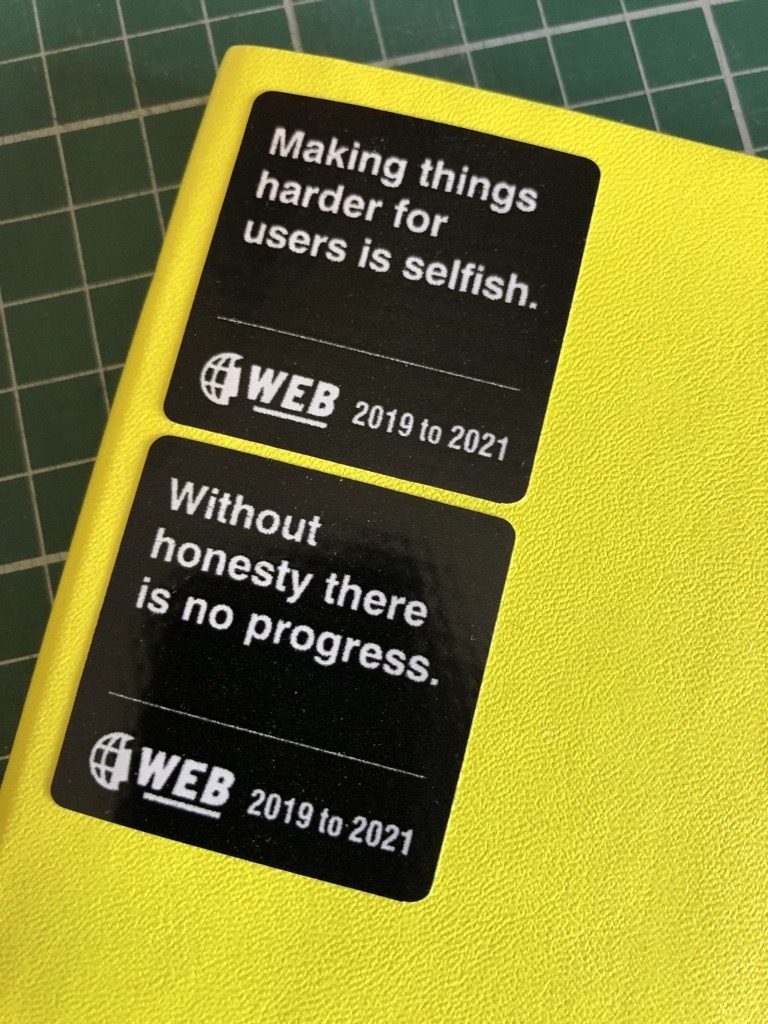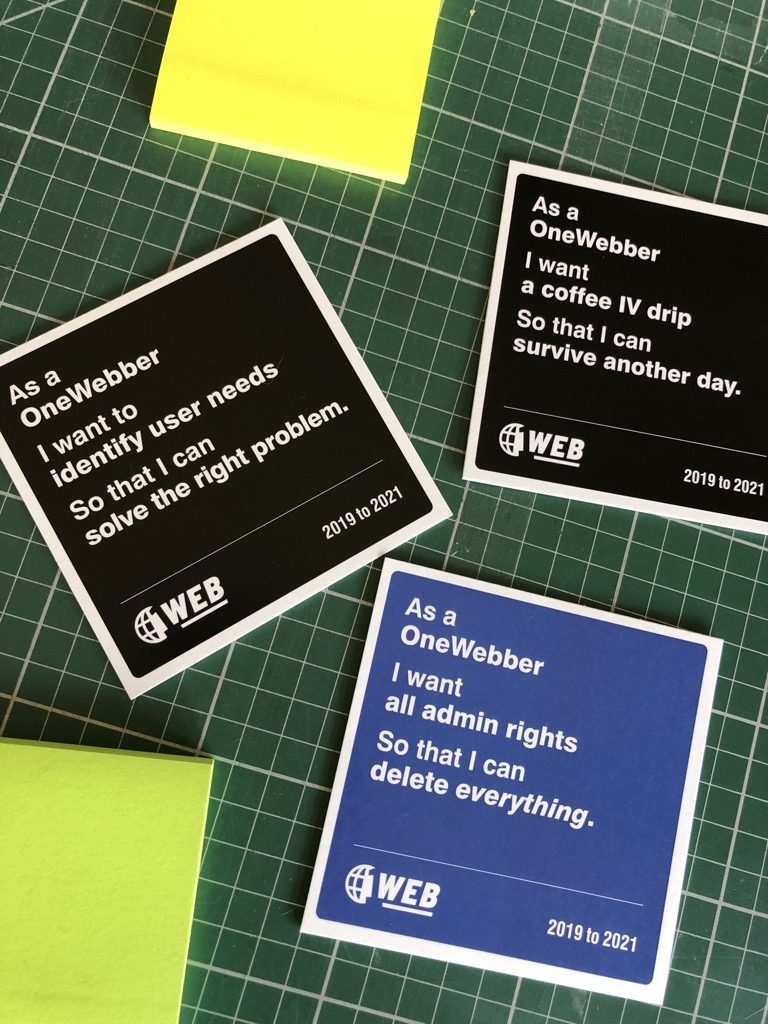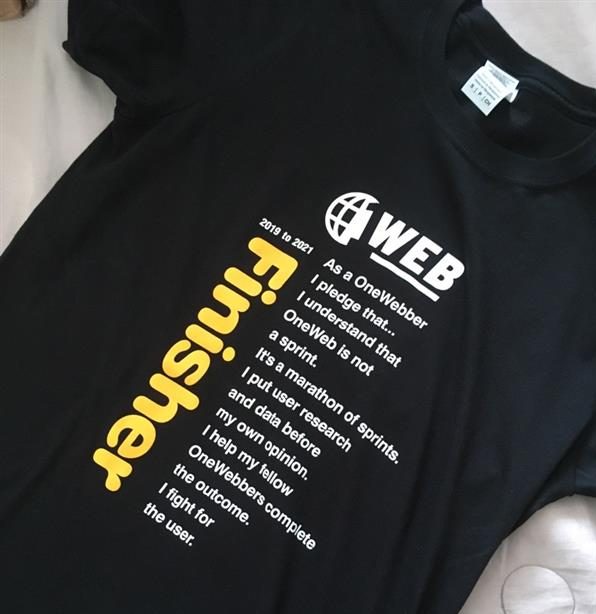This blog post is inspired by my team and is an edited version of a letter dedicated to them. Here goes:
We’re at the end of the OneWeb programme (but not the end of the University’s journey with user centred design), and I wanted to take a moment and recognise what an immense privilege it’s been working with all of you talented people. You are all worthy of this recognition – whether you have been:
- working directly on products and services,
- in a more supportive role as part of Business As Usual,
- seconded to join us,
- playing a specialist part as a contractor coming to work with us for a fixed amount of time.
The past 2.5 years were tough. Delivering a complex programme transparently and at pace, with many stakeholders across the University, was always going to be a significant challenge. What we hadn’t planned for was doing so remotely, in the midst of a global pandemic. It would have been reasonable to expect us to pause, de-scope or end the programme early to release costs. I’m keen for you to look back at what we’ve achieved despite the challenges we faced as part of this delivery.
I thought I’d use the time to reflect, and share something that only occurred to me in the past few weeks, because I’m still working through the closure activities for the programme, but also as a result of many conversations and discussion points I am having to make on behalf of our team so we can protect what we have achieved longer-term for the University.
Without honesty there is no progress
I consider myself lucky. I have worked with some really excellent managers, peers, and award-winning leaders over what I can define as a diverse career. Some of them have no idea how much they impacted me, I learned so much from each and every one of them.

Caption: OneWeb end of programme stickers ‘without honesty there is no progress.’
One thing definitely sticks – I grew up in a culture that encouraged openness and feedback and therefore I always sought constructive comments about my performance, and this is something I would encourage you all to do, wherever you end up working. It helped me with personal relationships and also at work. It’s not always pretty, or comfortable but hey – I know I am not perfect (forever a student, forever work in progress ;-))!
Imagine your employees are volunteering for you.
A few experiences from my early career have been haunting me recently. Maybe it’s because I am busy wrapping up a few things as part of the programme, but also because I had to say goodbye to a few very dear teammates recently, and a few others in the coming weeks.
I recall a specific situation when I was a proper junior and, despite being at the bottom of the pecking order, I was treated as a specialist with professional knowledge and expected to make decisions and collaborate with other departments based on the training I received. I am not saying that there was no hierarchy (there was), but we were trusted to make decisions and communicate and escalate accordingly. There was a process. Accountability was clear. There were clear expectations about deliverables. But the point I want to make is that I was treated like an employee who was volunteering for the work.
But how is this related to my team?
Let me get to the point.
We make choices every single day
As a manager, responsible for people’s livelihoods and well-being, I try to imagine you all as volunteers. I’m sure there were times where you felt my pressure and stress and I can think of some situations where (especially my direct reports) felt the effects of days full of long, but useful and challenging, conversations with senior executives.
I am sorry about that.
My motivation for leading you was beyond the usual digital transformation arguments of staying relevant and needing to adapt so the organisation is still a viable option in a crowded market. A key reason to embrace this work was to showcase the University as a ‘happening’ workplace that could attract talent, internally and externally. I wanted to demonstrate how adapting to change and demonstrating it, could bring in the right people. A melting pot of cognitive diversity. Because attracting talent gives organisations a competitive advantage. Full stop.
Any manager out there will be lying if at some point in their career they didn’t think their team can shoulder a burden because they are compensated handsomely, or it doesn’t matter if they don’t enjoy their job because they’re not going to leave anyway, or stuff like that.
But how does thinking of your team as volunteers, who have kindly donated their time to deliver your dream, affect how you treat them?
- more respect?
- more trust?
- more care?
- more enjoyment in your work?
- more skills development?
Right now I am responsible for a high-performing function. For any new digital culture to thrive and be adopted beyond the lifespan of a transformation programme (and no, I am not talking about the whole organisation getting Google level 2 certification is a digital transformation initiative), it is key to invest in building the capacity internally. I am grateful for all the ‘early adopters’ who took the time to speak with me, find out more about what we’re trying to do and for taking a leap of faith. I’m also very grateful to those who followed, and to those who showed an untapped talent and just needed a chance.
You are all doing some amazing things in the digital space – whether it is human-centred design, human-centred code, human-centred delivery. You’re a knockout team.
Every single day that you are turning down another offer and choosing to stay means a great deal and makes a massive difference.

Caption: As a OneWebber user story coasters
When I joined the team in 2017, we were a smaller group; we have grown significantly since then – in numbers, skills and confidence. We’re in demand within our organisation because we showed our value, but I am under no illusions that there is still a lot to do to carry our message in a vast and complicated place.
During OneWeb we had very little churn in fixed term and permanent positions, which is actually pretty unusual for a multi-years programme. I tried to give you interesting work in a supportive and compassionate environment. We didn’t avoid difficult conversations, I wasn’t always nice, but I hope you recognise that we got through some pretty tough stuff in a human way.
To the best of my ability, I have tried to keep communications with you all honest and transparent – only you can judge if it helped. We have faced unprecedented challenges in the last year and I hope, with all the difficulty this has caused, that you have always known we were facing them together. And I hope you’ve been able to see and recognise how much respect I have for you all.
Telling the truth can be hard
The focus of the work we’ve carried out as part of OneWeb carries a lot of weight, especially with the people who do not have a voice in the room – the actual people who use our services. Those that get confused in finding information, or see our own internal backend systems open to all! We have a responsibility to the wider community to use our voice, interact with users on a regular basis and represent this through debate, raising awareness and educating others. I hope, very much, that things only go from strength to strength – the need for our work is urgent. Your work really matters.

Caption: OneWeb end of programme ‘Finisher’ t-shirt
I also appreciate that working in the right way requires constant vigilance. Working in a team that makes good choices on behalf of people is what we’re about. You’re the gatekeepers. It does mean asking questions such as ‘why’ and also occasionally saying ‘no’. Sure, a level of pragmatism is required, but if you never expose bad practice and bring it to the light, no change can happen.
Telling the truth can be hard. Showing the truth to an organisation or a colleague can often be uneasy. Yet, the hardest truths to tell are usually the ones about ourselves. For example, how can I tell you that I don’t have answers to your questions? It requires some humility to admit that you’re better equipped than me to make certain decisions because you are closer to the information. It requires a change of mindset – putting my ego to one side. To an extent we all had to do it.
My parental instincts will always kick in when it is to do with my team. So on the eve of closing down the programme and moving the team into Business As Usual (whatever ‘usual’ means), I hope you know that I will always try to do my best for you. I trust you to make the right decisions, to do what’s right for your well-being, for the good of the University, and most importantly for the good of the humans we are building digital services for.
Thank you for being a force for good. Keep pushing this work forward.
Thank you for being one bad**s team.
Yours, Ayala